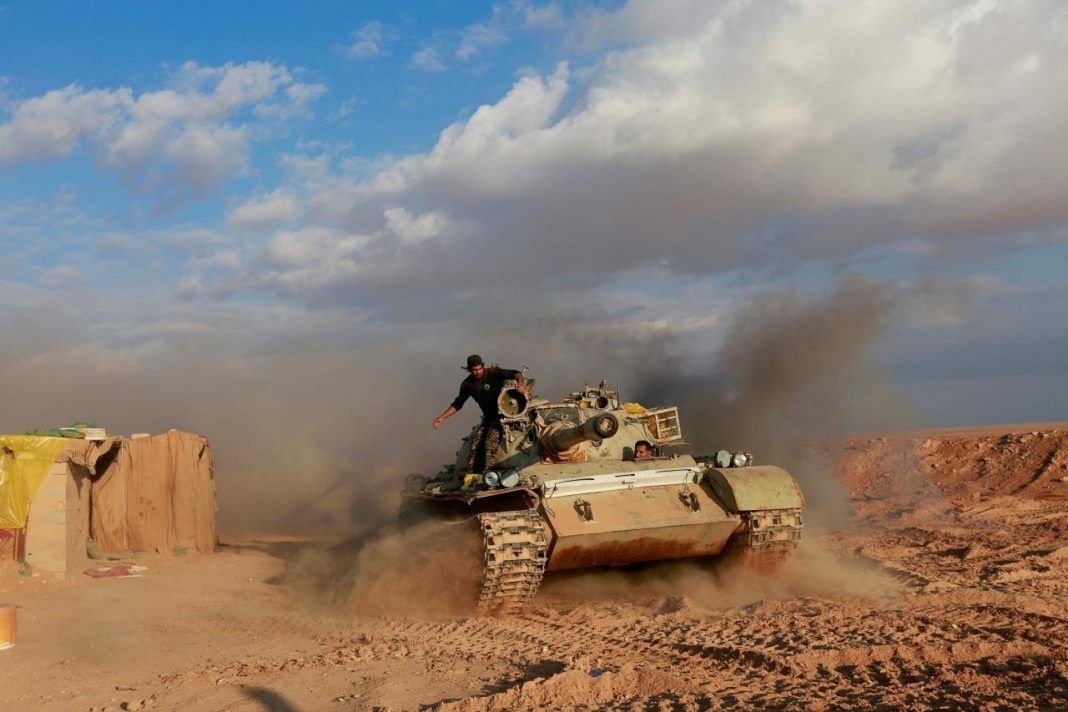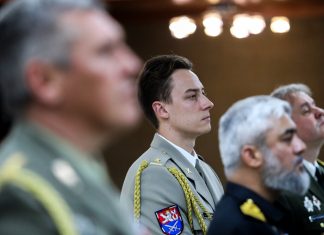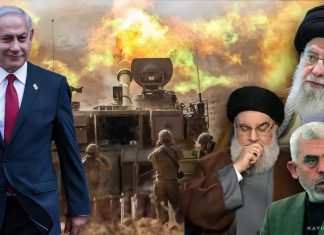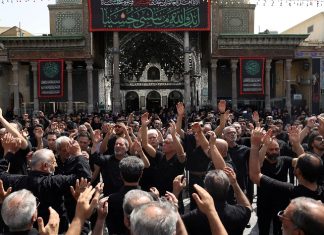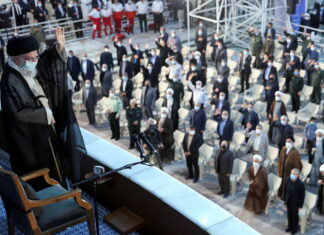On Feb. 29, an organization called Iran’s Military Advisory Center (MAC) in Syria released a statement urging the Turkish military to stop attacking Shia militia and Hezbollah forces operating under the auspices of the Islamic Revolutionary Guards Corps (IRGC) in the northwestern Syrian city of Idlib, the semi-official Fars news agency reported.
The statement was in response to the escalation of fighting between the Turkish military and pro-government forces in Syria.
An airstrike by the Russian and Syrian forces on Feb 27 killed 33 Turkish soldiers in Idlib, prompting Ankara to launch a major offensive against the Syrian government of President Bashar al-Assad, which involved pounding military bases and positions of Iranian-backed militias in northern Syria.
The statement by MAC said:
- We responded to a request from the Syrian government to join its military and liberate the M5 [Aleppo-Damascus Highway]. Afterward, the IRGC, Hezbollah, and the Syrian Resistance forces helped the local residence.
- Turkish-backed armed groups attacked Syrian military bases after we retook the highway. We worked with the Syrian military to secure the M5 again.
#Turkey Defense Ministry is sharing footage of military strikes against Assad regime tanks, military installations and other assets.
Vows to avenge Turkish martyrs #Syria #Aleppo #Turkey pic.twitter.com/L5xlGdm5m1
— National Security News (@Natsecuritynews) March 1, 2020
- The Turkish military has been within the striking range of our forces. However, the Syrian Resistance and other groups have not attacked Turkish troops under the Astana [Syrian Peace] agreement. We have not targeted the Turkish army so far.
- The Turkistan Islamic Party in Syria (TIP), Al-Nusra Front, armed militias from Tajikistan, and several terrorist groups have launched widespread attacks on the Syrian government forces. Our military has joined the Syrian army to prevent the fall of the freed territories.
- Despite the purely defensive nature of our actions, the Turkish military has carried out air raids and targeted our troops with guided missiles. We conveyed our intentions to the Turkish army through intermediaries, hoping that it would resolve the issue and stop their provocative actions and attacks.
- In their report, the mediators highlighted the attacks by Turkish-backed terrorist groups on our military bases. We and the Syrian army have been fighting the terrorists. Unfortunately, the Turkish military ignored our explanation entirely and continued to bomb our troops, killing several of our fighters.
- Turkish artillery has continued to attack our military bases. Through our intermediaries, we informed the Turkish military that we did not want to fight them. We pointed out that our commanders were trying to find a diplomatic solution to the conflict between Turkey and Syria.
- To spare the lives of Turkish soldiers, we asked our forces not to attack their military bases starting March 1. The Turkish army, however, continued to strike our military bases and that of the Syrian government forces.
- MAC and the Syrian Resistance forces call on the Turkish military to protect the interests of the Turkish and Syrian nations by showing restraint. We remind the Turkish people that their children [soldiers] have been within the striking range of our forces for the past month. We could have exacted revenge, but our commanders ordered us not to take any action. We urge you to call on the authorities in Ankara to take action and prevent the death of Turkish soldiers.
- We remind you that despite the challenging situation, we will continue to stand by the Syrian government, nation, and military to drive the terrorists out and protect the territorial integrity of that country. We call on everyone to contemplate the grave consequences of attacking Syria.
The statement points out that despite a stark warning from the Islamic Republic regime, the Turkish army has continued to bomb the IRGC and Hezbollah military bases.
The Russian Air Force and the IRGC ground troops recently helped the Syrian army recapture the M5 motorway, which connects Aleppo to Damascus. The road had been under the control of the Syrian rebels for the past six years. The Turkish military and the rebels have tried to retake the highway by carrying out airstrikes and ground assaults on the Syrian army that killed a dozen members of the Iranian-backed forces.
Iran has not released the number of troops killed in the Turkish military attacks on the IRGC bases, but some reports put the dead at 30. They were mostly from the Shia Afghan Fatemiyoun Division (Liwa Fatemiyoun) and the Pakistani Shia Zainab Brigades (Liwa Zainabiyoon).
The Tasnim news agency reported on February 29 that a seminarian named Seyyed Ali Zanjani was among those who died in the Turkish attacks on the IRGC positions in Idlib.
According to the Sacred Defense news website (DEFA Press), three Hezbollah fighters were also killed in the battle. Iranian military reportedly plans to bury 12 soldiers from Fatemiyoun Division Zainab Brigades, who lost their lives in combat in Qom.
Iran, Turkey, and Russia agreed to a ceasefire in Syria and promised to find a diplomatic solution to the conflict under the articles of the 2018 Astana talks and the 2019 Sochi agreement. All three parties have been, however, engaged in proxy wars in the region.
After the outbreak of coronavirus, most countries have banned all flights to and from Iran. Turkey has gone even further by barring Iranian airlines from making an emergency landing in its airports. The move shows the increasing tensions between Tehran and Ankara.
Turkey has been Iran’s main ally in the region and has helped the country to bypass U.S. sanctions. The recent political and military clashes between Tehran and Ankara will hurt Iran more than Turkey.
In the first four years of the Syrian conflict, the Islamic Republic denied having any military presence in the country. Tehran eventually admitted to having sent several military advisers to Syria.
Most people inside and outside Iran had never heard of MAC while the former commander of the IRGC’s Qods Force (IRGC-QF) Lieutenant general Ghasem Soleimani was still alive. General Soleimani died in a targeted U.S. drone attack on the Baghdad International Airport on January 3.
[aesop_image img=”https://kayhanlife.com/wp-content/uploads/2020/01/2020-01-03T000000Z_1662943718_MT1ABCPR714624012_RTRMADP_3_ABACA-PRESS-scaled.jpg” panorama=”off” credit=”Undated photo of Iranian general Qassem Soleimani. REUTERS./” align=”center” lightbox=”on” captionsrc=”custom” captionposition=”left” revealfx=”off” overlay_revealfx=”off”]
All Iranian military forces in Syria operate under the auspices of the IRGC, which is most likely responsible for the above statement issued by MAC.
The last time Iran and Turkey were at the brink of a war was over a border dispute in the 1830s, which led to the signing of the Second Treaty of Erzurum in 1947 between Persia and the Ottoman Empire.
Turkey is the only other country besides the U.S. and Israel, which has attacked the IRGC bases in Syria.
“We will not leave Idlib to the [Syrian] regime, which does not understand our country’s determination, and to those encouraging it,” Turkish President Recep Tayyip Erdogan recently said.
[Translated from Persian by Fardine Hamidi]

